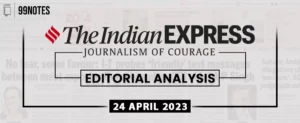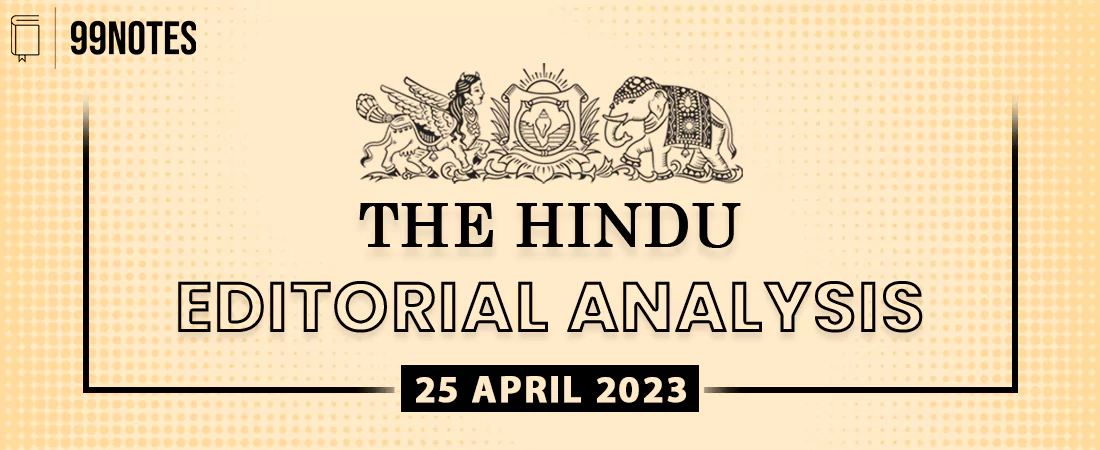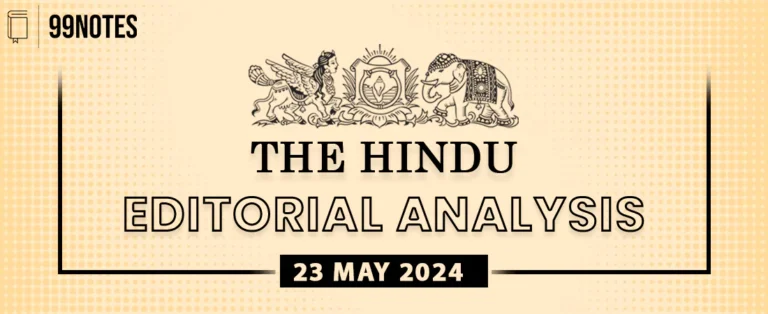25 April 2024 : The Hindu Editorial Notes PDF
The Hindu EDITORIAL
25-April-2024
1. The Indian seafarer deserves better in choppy high seas
| Topic: GS2 – International Relations – Important International institutions
Crucial for UPSC as it assesses India’s maritime security, international cooperation, and protection of seafarers’ rights. |
| Context: |
| ● The news highlights India’s efforts to address safety concerns for its seafarers amidst rising piracy and exploitation issues through submissions to the International Maritime Organization. |
Introduction: Rising Safety Concerns for Indian Seafarers
- Indian seafarers face escalating safety concerns due to recent attacks on commercial ships in sensitive regions like the Red Sea and the Strait of Hormuz.
- India has submitted three papers to the International Maritime Organization (IMO) to address seafarers’ security, contractual terms, and broader maritime security challenges.
- These submissions underscore the need for a comprehensive approach to maritime security and improved conditions for seafarers.
Resurgence of Sea Piracy
- Recent pirate attacks off the coast of Somalia indicate a resurgence of piracy, with vessels like the MV Ruen and MV Lila Norfolk being targeted.
- India calls for vigilance, proactive measures, and international cooperation to combat piracy, aligning with the United Nations Convention on the Law of the Sea.
- These attacks highlight the importance of international cooperation and adherence to maritime laws to safeguard seafarers and maintain maritime security.
Impact of Unlawful Recruitment Practices
- Unlawful recruitment practices negatively impact seafarers’ well-being and international trade.
- India reports over 200 cases of seafarer exploitation since 2020, urging international coordination to address these issues under the Maritime Labour Convention, 2006.
- Improved international cooperation is essential to ensure seafarers’ rights and prevent exploitation in the maritime industry.
Challenges Faced by Indian Seafarers
- Indian seafarers, comprising 9.35% of the global seafaring population, confront various challenges, including recent incidents such as the seizure of MSC Aries and the detention of MT Heroic Idun in Nigeria.
- A survey highlights seafarers’ vulnerabilities, including lack of legal representation and awareness of their rights.
- India’s submissions to the IMO emphasize seafarers’ security and contract terms, necessitating enhanced international cooperation to protect seafarers amidst rising incidents and geopolitical tensions.
Initiatives and Challenges in Ensuring Seafarers’ Rights
- The Indian government and the National Human Rights Commission launched the ‘human rights at sea’ initiative to address abuses against Indian seafarers, including cases of imprisonment and illegal detentions.
- However, challenges persist in holding ship owners accountable for violations and protecting seafarers’ rights under foreign registrations.
- Proactive cooperation among stakeholders is crucial to safeguard human rights in the maritime industry and ensure seafarers’ well-being.
Addressing the Growing Concern of Maritime Piracy
- Maritime piracy poses a growing concern for Indian seafarers, with a more than 10% increase in serious piracy incidents over the last 10 months.
- Private guards on merchant navy ships can deter piracy, but the volatile nature of piracy-prone oceans presents challenges.
- Reports highlight exploitation of Indian seafarers by Iranian shipping companies, underscoring the need for improved protection measures and government support.
Conclusion: Urgent Need for Enhanced Protection Measures
- Recent attacks on commercial ships have heightened safety concerns among Indian seafarers, prompting the need for government support and enhanced protection measures.
- India aims to increase its share of global seafarers to 20% in the next 10 to 20 years, emphasising the importance of improving rights and protection for seafarers in the maritime industry.
| PYQ: In 2012, the longitudinal marking of the high-risk areas for piracy was moved from 65° East to 78° east in the Arabian Sea by International Maritime organisation. What impact does this have on India’s maritime security concerns? (200 words/12.5m) (UPSC CSE (M) GS-3 2014) |
| Practice Question: Discuss India’s strategies to address safety concerns for its seafarers and enhance maritime security, highlighting international cooperation efforts. (250 Words /15 marks) |
2. The reality of the Swacch Bharat Mission
| Topic: GS2 – Governance – Government policies
Crucial for UPSC as it assesses India’s environmental policies, sustainable development goals, and global competitiveness. |
| Context: |
| ● The article discusses India’s low ranking in the Environment Performance Index (EPI), critiquing development initiatives like Swachh Bharat Mission and highlighting challenges in sanitation and waste management. |
India’s Low Ranking in the Environment Performance Index (EPI)
- India ranked at the bottom of 180 countries in the 2022 Environment Performance Index (EPI).
- EPI evaluates countries based on climate change performance, environmental health, and ecosystem vitality using 40 performance indicators across 11 categories.
- The Indian government criticized the EPI’s methodology, claiming it doesn’t accurately reflect India’s environmental situation.
Critique of Development Initiatives
- Despite initiatives like Swachh Bharat Mission (SBM), Atal Mission for Rejuvenation and Urban Transformation (AMRUT), Pradhan Mantri Awas Yojana (PMAY), and National Clean Air Programme (NCAP), India’s environmental performance remains poor.
- These missions aimed to improve living standards and address issues like sanitation and clean energy but have failed to mitigate air and water pollution.
- The SBM, for instance, continues caste-based sanitation practices and relies on capital-intensive technologies without effectively addressing waste management.
Challenges with Swachh Bharat Mission
- SBM aimed to eliminate open defecation and promote sanitation, but challenges persist.
- Reports highlight poor quality construction of toilets, lack of access to public toilets in slums, and inadequate waste treatment in rural areas.
- The reliance on capital-intensive technologies in waste management has led to inefficiencies and health crises, perpetuating caste discrimination.
Privatisation of Sanitation Services
- Government initiatives have outsourced waste management to private contractors, exacerbating caste discrimination.
- Large contractors employ subjugated communities, particularly Dalits, in sanitation work, perpetuating social inequalities.
- Municipalities face shortages of sanitation inspectors, hindering effective waste management.
Linking EPI Performance to Development Model
- India’s low EPI ranking exposes flaws in its development model and sustainability.
- The Supreme Court’s observation on the link between climate change and human rights underscores the need to reassess development policies.
- Anthropogenic and systemic factors contribute to environmental challenges, necessitating a reevaluation of development models and policies.
Conclusion: Need for Policy Alignment with Human Rights
- India’s poor EPI performance highlights the inadequacy of current development approaches in addressing environmental issues.
- Aligning policies with human rights is essential to address climate change and ensure sustainable development.
- Reforms are needed to mitigate environmental degradation and promote equitable development in India.
| Steps taken by Indian government for betterment of sanitation |
● ODF Plus Achievement:
|
| PYQ: One of the intended objectives of Union Budget 2017-18 is to ‘transform, energise and clean India’. Analyse the measures proposed in the Budget 2017-18 to achieve the objective. (250 words/15m) (UPSC CSE (M) GS-3 2017) |
| Practice Question: Analyse India’s challenges in achieving environmental sustainability despite its development initiatives, with a focus on the Swachh Bharat Mission. (150 Words /10 marks) |
For Enquiry

25 April 2024 : The Hindu Editorial Notes PDF

25 April 2024 : PIB Summary for UPSC

25 April 2024 : Indian Express Editorial Analysis

25 April 2024 : Daily Current Affairs

UP Police Constable Salary- Pay Scale, Benefits, Roles and Responsibilities

24 April 2024 : Daily Current Affairs Quiz

24 April 2024 : Daily Answer Writing

24 April 2024 : Daily Current Affairs

24 April 2024 : The Hindu Editorial Notes PDF

24 April 2024 : PIB Summary for UPSC
April 2024 The Hindu Editorial 25 April 2024 : The Hindu Editorial Notes PDF The Hindu EDITORIAL
24-April-2024
1. The Indian seafarer deserves better in choppy high seas
Topic:…
April 2024 PIB 25 April 2024 : PIB Summary for UPSC PIB Summary for UPSC
25-April-2024
1. PM addresses 6th edition of International Conference on Disaster…
April 2024 Indian Express 25 April 2024 : Indian Express Editorial Analysis Indian Express Editorial Analysis
25-April-2024
1. A solution that isn’t
Topic: GS2 – International…
April 2024 Daily Current Affairs 25 April 2024 : Daily Current Affairs Daily Current Affairs
23-April -2024- Top News of the Day3
1. No forests or animals will be left if human-wildlife…
Blogs Upsc UP Police Constable Salary- Pay Scale, Benefits, Roles and Responsibilities UP Police Constable Salary– The starting salary of UP Police Commissioner is an attractive INR…
Daily Quiz 24 April 2024 : Daily Current Affairs Quiz 24- April 2024 : Daily Quiz…
mains answer writing 24 April 2024 : Daily Answer Writing Mains Answer Writing
24-April-2024
Q1) Agriculture sector needs to turn into an enterprise to become…
April 2024 Daily Current Affairs 24 April 2024 : Daily Current Affairs Daily Current Affairs
24-April -2024- Top News of the Day3
1. How is India planning to boost EV production?
Topic:…
April 2024 The Hindu Editorial 24 April 2024 : The Hindu Editorial Notes PDF The Hindu EDITORIAL
24-April-2024
1. Toss out the junk food, bring back the healthy food plate
Topic:…
April 2024 PIB 24 April 2024 : PIB Summary for UPSC PIB Summary for UPSC
24-April-2024
1. New NCPOR study attempts to resolve the Mystery of extremely low…




